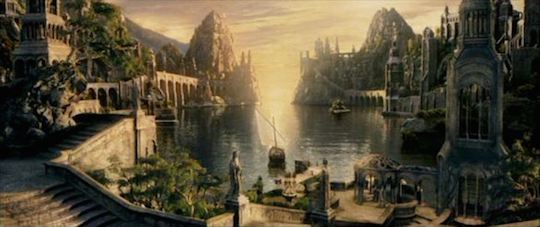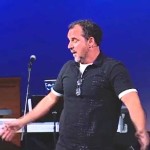We run our website the way we wished the whole internet worked: we provide high quality original content with no ads. We are funded solely by your direct support. Please consider supporting this project.
Of Revelation and The Lord of the Rings

Image via Abnormal Anabaptist
As most of you know, Greg has been preaching a sermon series on the book of Revelation. He’s got a very different take on this book than the popular Christian culture that sprouted the Left Behind series. Greg argues that John takes all of the violent images of his day and turns them on their head to reveal Jesus as the Lamb of God who conquers with his own death rather than the death of his enemies. If you haven’t had a chance to listen to them, it would be well worth your time.
Robert Martin wrote a reflection on how this series is changing the way he thinks about this topic. Robert is a big fan of The Lord of the Rings, and he uses this story as a way to illustrate his change in thinking. Brilliant and inspiring.
Here’s a little snippet of his blog post, but you’ll want to check out the entire post to fully get his point.
For those in Middle-Earth who stop looking to the past and look, instead, towards this future, the strivings take on a different tone. No longer are they striving to regain the past. Instead, they are aiming to capture a little bit of that future in the present. There is a hope that they have that comes, not from attempting to regain something lost, but from trying to attain something that is yet to gain. And it is that “not yet” that causes them to make amazing sacrifices.
This is captured in probably one of the more poignant scenes in the movie. The actual words take place a lot earlier in the novels, but Gandalf and Pippin, faced with imminent death, faced with a hopelessness of “why bother if this is the end”, have a moment where Gandalf describes the hope, a hope that he, actually, has seen. Watch this:
Category: General
Tags: Book of Revelation, Eschatology, Hope, Left Behind, Lord of the Rings, Robert Martin
Related Reading

A Guide to the Book of Revelation
Marc Nozell via Compfight Kurt Willems posted this excellent guide for reading the Book of Revelation as it was intended to be read. As Kurt points out, this is the most misunderstood and misinterpreted book of the Bible. If you were weaned on A Thief in the Night or the Left Behind series of books,…

The Hope of the Cross & Resurrection
In a real sense, God has already “raised us up with Christ and seated us with him in the heavenly realms” (Eph 2:6). And while “we do not see everything subject to [us],” the truth of the matter is that, in Christ, we have already been restored to our rightful place as co-rulers with Christ.…

Sermons: A Vision of Beauty
In this short sermon clip, Greg Boyd discusses how God, science, and nature can work together to tell us the story of our universe. In the full sermon, Greg begins the series on Revelation and shows us three things to keep in mind when reading the book of Revelation. You can view the full sermon…

Reflecting on the Conference and Cynicism
We had such a great time this weekend at the Faith, Doubt & the Idol of Certainty conference. People came from all over the United States and it was good to get a chance to connect. We’re more convinced than ever that God is up to something beautiful and real. You’ll be hearing more about…

New Feature: We Need YOU!
For the last several years we’ve been running a feature every Friday called Lighten Up. It was fun for a while, but it’s gotten harder and harder to find light-hearted, relevant content. That’s where you come in. We’d like to start something slightly different on Fridays that features content sent to us by YOU! There’s…

Responding to Driscoll’s “Is God a Pacifist?” Part I
I’m sure many of you have read Mark Driscoll’s recent blog titled “Is God a Pacifist?” in which he argues against Christian pacifism. I’ve decided to address this in a series of three posts, not because I think Driscoll’s arguments are particularly noteworthy, but because it provides me with an opportunity to make a case against what I’ve…
